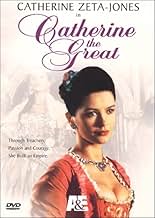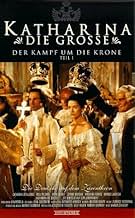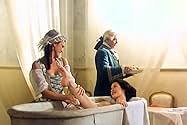Catarina: Entre o Amor e o Poder
Título original: Catherine the Great
- Filme para televisão
- 1995
- 1 h 40 min
AVALIAÇÃO DA IMDb
6,1/10
1,4 mil
SUA AVALIAÇÃO
Adicionar um enredo no seu idiomaTrapped in a loveless arranged marriage to the immature future Czar, a young German Princess proves a skillful political infighter and rises to become Catherine the Great.Trapped in a loveless arranged marriage to the immature future Czar, a young German Princess proves a skillful political infighter and rises to become Catherine the Great.Trapped in a loveless arranged marriage to the immature future Czar, a young German Princess proves a skillful political infighter and rises to become Catherine the Great.
- Direção
- Roteiristas
- Artistas
- Prêmios
- 1 vitória no total
- Direção
- Roteiristas
- Elenco e equipe completos
- Produção, bilheteria e muito mais no IMDbPro
Avaliações em destaque
The Empress Elizabeth II rules mid-eighteenth century Russia. She marries her heir, the physically impotent German prince Peter, to the German princess, Catherine (Catherine Zeta-Jones). Catherine takes a lover, bears a child, plots against her husband and deposes him after he has reigned only six months. She becomes the Empress Catherine II. Well-educated and with liberal ideas, she is an astute politician and wages war with success. Yet when rebellion confronts her with the choice between fostering freedom and suppressing rebellion, she chooses suppression.
Catherine II was a fascinating and complex ruler, the period was crucial in determining the future course of Russia, its expansionary empire, its reactionary society and primitive economy. This film, however, addresses none of these great themes, except in the most cursory and superficial manner. It is a shallow drama of empty spectacle, in which intimate diversions are followed by unconvincing public events, battles and rebellions. The psychological characteristics of the protagonists, the motivations that drive them, the reasons for their decisions are all left unexplained. "There are great matters at stake", says Catherine to Potyomkin (Paul McGann), but we are never told what they are. Such rationalizations as do emerge involve the anachronistic importation of late twentieth-century western liberal concerns into eighteenth-century Russian society.
Television drama need not seem cheap. This film does. There is a good cast, but the dialogue is empty and its delivery perfunctory, although Ian Richardson's Vorontsov is done well and Brian Blessed is surprisingly well-moduated (and exceptionally quiet) as Bestuzhev. Generally, the cast seems dispirited by the trite, thin, lines they are asked to utter. One hundred minutes spent watching Miss Zeta-Jones will always have its rewards. None the less, she is miscast. Most particularly, her voice is in its nature contemporary and middle class, with its very modern inability correctly to pronounce the letter 'r'; it is unsuitable to the role of an eighteenth century aristocrat and Empress. The set pieces are sparse and unconvincing and the direction humdrum.
The story and this cast deserved better than this slight spectacle.
Catherine II was a fascinating and complex ruler, the period was crucial in determining the future course of Russia, its expansionary empire, its reactionary society and primitive economy. This film, however, addresses none of these great themes, except in the most cursory and superficial manner. It is a shallow drama of empty spectacle, in which intimate diversions are followed by unconvincing public events, battles and rebellions. The psychological characteristics of the protagonists, the motivations that drive them, the reasons for their decisions are all left unexplained. "There are great matters at stake", says Catherine to Potyomkin (Paul McGann), but we are never told what they are. Such rationalizations as do emerge involve the anachronistic importation of late twentieth-century western liberal concerns into eighteenth-century Russian society.
Television drama need not seem cheap. This film does. There is a good cast, but the dialogue is empty and its delivery perfunctory, although Ian Richardson's Vorontsov is done well and Brian Blessed is surprisingly well-moduated (and exceptionally quiet) as Bestuzhev. Generally, the cast seems dispirited by the trite, thin, lines they are asked to utter. One hundred minutes spent watching Miss Zeta-Jones will always have its rewards. None the less, she is miscast. Most particularly, her voice is in its nature contemporary and middle class, with its very modern inability correctly to pronounce the letter 'r'; it is unsuitable to the role of an eighteenth century aristocrat and Empress. The set pieces are sparse and unconvincing and the direction humdrum.
The story and this cast deserved better than this slight spectacle.
I'll have to admit at the out-set, here, that I know very little about Russian history. That being said, I was expecting a great deal more from this movie than was given. Catherine was purportedly a visionary that changed Russian society by instituting laws that helped the poor and was a patron of the arts. We saw none of that in this move, only a person driven by ruthless ambition.
I thought that toward the end of the move we would begin to see some philosophy or ethics form part of her character, but this was not to be. When she allowed her political opponent to be executed at the end of the film, a man both brave and righteous, the movie fell apart. A shame.
I thought that toward the end of the move we would begin to see some philosophy or ethics form part of her character, but this was not to be. When she allowed her political opponent to be executed at the end of the film, a man both brave and righteous, the movie fell apart. A shame.
a visual delight. a credible Catherine. great cast. and that is not all. it is not a documentary and not a serious analysis of Tsarina reign. it is only a good axis for rainy day and not bad occasion to admire Catherine Zeta-Jones in a pretty role. the acting - a film with Jeanne Moreau,Ian Richardson, Mel Ferrer has not the problems in this domain. and Omar Sharif presence is the best sign for recognize a film who could be not very serious. a brilliant fresco about a Russian period. high ambitions, reasonable solutions. and fun at whole because not only the flavor of atmosphere is important but the nice build of fundamental moments. a film with few drops of fairy tale. good option against the Disney princes fashion.
Hey guys, After having read the preceding reviews and of course having seen the flick I just had to add this comment: I take my movies seriously and I take my history seriously---in general. I will easily admit that this film is a bit weak on both scores. But everybody obviously had a wonderful time!
And sometimes that counts for something. I had not seen Miss Zeta-Jones before but I am certainly glad to have seen her now. I will admit that Mae West was probably closer to the real Catherine (complexionwise, haircolorwise, and probably even sexualproclivitywise) but it was an absolute pleasure to watch a woman who is imperious as well as beautiful play a part in which she is required to be both those things! I mean, she pulled it off! And she looked absolutely great doing it! I Can't wait to see her again. Well now, the historic issues. I am really sorry that Potemkin didn't get a chance to show Catherine a Potemkin village in this particular version, but other than that the history didn't really bother me all that much. The fact is, I kind of liked the plot, even if it does come from never never land. So put me down as a complete Philistine if you will, I can't help but admit that I enjoyed this thing thoroughly, misguided as I may be. And let me throw in one more kudo. Anyone who cut his teeth on "Gunsmoke" as Mr. Chomsky did, and winds up directing a Russian Czarina quoting Rousseau can't be all bad. I hope you like it too.
And sometimes that counts for something. I had not seen Miss Zeta-Jones before but I am certainly glad to have seen her now. I will admit that Mae West was probably closer to the real Catherine (complexionwise, haircolorwise, and probably even sexualproclivitywise) but it was an absolute pleasure to watch a woman who is imperious as well as beautiful play a part in which she is required to be both those things! I mean, she pulled it off! And she looked absolutely great doing it! I Can't wait to see her again. Well now, the historic issues. I am really sorry that Potemkin didn't get a chance to show Catherine a Potemkin village in this particular version, but other than that the history didn't really bother me all that much. The fact is, I kind of liked the plot, even if it does come from never never land. So put me down as a complete Philistine if you will, I can't help but admit that I enjoyed this thing thoroughly, misguided as I may be. And let me throw in one more kudo. Anyone who cut his teeth on "Gunsmoke" as Mr. Chomsky did, and winds up directing a Russian Czarina quoting Rousseau can't be all bad. I hope you like it too.
Although fairly interesting to watch, Katharina is very historically inaccurate and biased, which is partly due to the horrible miscasting. Just to name a few: 1. Catherine Zeta-Jones as Empress Catherine II: a actress who is young, beautiful, dark in complexion and extremely attractive is certainly a poor choice to play a pale, plain middle-aged nimphomaniac. No one would ever address the real Catherine II as "you pretty thing", as Pugachev did in the film! 2. Jeanne Moreau as Empress Elizabeth: a 70-year old playing a 40-year old (I think this is self-explanatory) 3. Omar Sharif as Count Razumovsky: a 65-year old with a typically mediterranean appearance as a 45-year-old Ukrainian... 4. Rhys-Meyers as Pugachev... Don't know where to start... Apart from the fact that the actor is once again much older that his character, Rhys-Meyers is a BAD choice to play a violent, charismatic, almost demonic, and at the same time very folkish, Emelian Pugachev. Rhys-Meyers just doesn't look like an escaped convict-mass-murdered-highway robber-impostor or any of what real-life Pugachev was. Apart from that, a particularly striking misportrayal is the execution of Pugachev. The filmmakers have it take place in the summer in front of a crowd of about 5, while in reality it took place in the middle of winter on the Red Square in Moscow in front of a crowd of perhaps a 100,000, and was an extremely dramatic event, one the biggest public spectacles in Russia's history. So much for the fillmakers... Also, the story of Catherine's marriage to Peter III is portarayed in a highly prejudiced manner, drawing an all-too-clear line between the supposedly "good guys" (namely Catherine, Orlov, and the bunch) an the "horrible monster" Peter III. The story was not nearly so black-and-white in reality. Apart from that, the film makes fairly decent viewing. Balancing the two, I give it a 6/10
Você sabia?
- CuriosidadesJeanne Moreau (Elizabeth) played Catherine in Great Catherine (1969).
- Erros de gravaçãoWhen Catherine trades in her virginity to get pregnant, the skin of her mate's back and legs is tanned, while his buttocks are perfectly white. There were neither sunbathing nor a pair of trunks in 18th century.
- Versões alternativasApprox. 80 minutes were deleted from the US version by A&E compared to the original German version which was shown in 2 parts a 90 minutes.
- ConexõesFeatured in Neighbours: A 10th Anniversary Celebration (1995)
Principais escolhas
Faça login para avaliar e ver a lista de recomendações personalizadas
Detalhes
- Data de lançamento
- Países de origem
- Idioma
- Também conhecido como
- Catarina, a Grande
- Locações de filme
- Empresas de produção
- Consulte mais créditos da empresa na IMDbPro
- Tempo de duração1 hora 40 minutos
- Mixagem de som
- Proporção
- 1.33 : 1
Contribua para esta página
Sugerir uma alteração ou adicionar conteúdo ausente





































